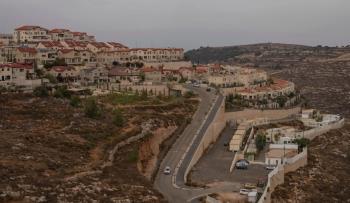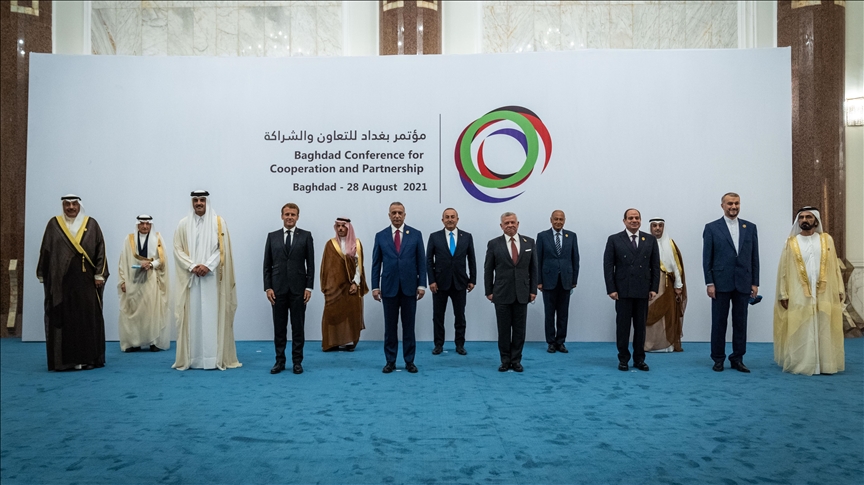Alwaght- Baghdad conference was held on Saturday with the presence of various actors. The one-day meeting, titled "Baghdad Conference for Cooperation and Partnership", saw participation of the five Security Council members' representatives in addition to regional states. President Emmanuel Macron of France was the only head of state of a non-regional country taking part in the conference. President Abdel Fatah el-Sisi of Egypt, King Abdullah II of Jordan, and Sheikh Tamim bin Hamad Al Thani of Qatar were the regional heads of state to participate. From Saudi Arabia, Foreign Minister Faisal bin Farhan took part in the conference.
The Baghdad summit came at a time when tensions between actors and various powers in the region have risen sharply in the years since 2011, when a wave of popular uprisings swept through the Arab world. In recent months, however, tensions have moved to easing and de-escalation is seriously being considered by some actors, especially Saudi Arabia and Iran. NATO withdrawal from Afghanistan and the deadly Kabul airport bombings have also raised serious concerns about the rise and spread of radicalism in the region among various actors. In addition to its original goals, Baghdad conference seemed to offer a window of opportunity for the participants to discuss the issues the regional security and order have ahead.
Eye-catching points about invitees
The order and level of the invitees of Baghdad summit is significant. Here are some points.
Absence of Syria: One considerable point about the summit was the absence of Syria. This happened as earlier Falih al-Fayyadh, the head of Iraq's Popular Mobilization Forces (PMF), had met with President Obama Bashar al-Assad of Syria during his recent visit to Damascus and invited him to attend the Baghdad summit, but now evidence suggests that Macron blocked the invitation of Syrian president. In recent years, Baghdad and Damascus have taken steps to further develop and improve security, military, political and economic cooperation. In the current situation, Damascus has overcome the initial political crisis and foreign and domestic conspiracies. The West and France's influence on Syria invitation is a failed attempt to prevent Syrian leader position restoration in the region.
The reason and goal behind Macron participation: The French president was the only head of a non-regional country to participate in Baghdad conference. As an initial reason for his participation, it can be said that Paris is aspiring to restore its traditional place in West Asia and North Africa. In recent years, France rapidly got involved in African wars like Libya, Mali and Central African Republic. However, recently, it turned into a diplomatic force in West Asia. Despite securing some economic interests in West Asia, France has been unable to achieve its political goals due to some hasty policies, for example against Syria and Iran. In the late years of President François Hollande and initial years of Macron, France decided that it needs to review its West Asia policies and embark on new ones in line with changes. The main theme of the new policy was revival of the old French glory once President Charles de Gaulle dreamed of. However, Macron's tactics and strategies differ from those of his predecessors.
Reviewing some of the failed policies of the past decade, Macron tries to reverse them by adopting multilateralism as a general and successful policy in the form of alignment with the US and the European Union in different parts of the world, especially in West Asia. Considering Washington's "pivot to East" policy that was raised by President Barack Obama, Macron is mobilizing Paris power to fill the potential vacuum left by the US exit from West Asia. With this strategy, the past glory of France will be revived, either within the framework of the union of Western states or individually. Macron's presence in Baghdad could be a continuation of the same Paris approach, under which Iraq and Syria provide the main path to the French journey to this aim.
Iran highlights General Soleimani assassination pursuit, criticizes not inviting Syria
Another important point of Baghdad summit was the presence of the new Iranian Foreign Minister Hussein Amir-Abdollahian. Upon his arrival in Baghdad, Zarif's successor slammed not inviting Syria to the conference and vowed that pursuing the assassination of the top Iranian anti-terror General Qassem Soleimani will be one of his top priorities. General Soleimani was assassinated along with Iraq PMF deputy commander Abu Mahdi al-Muhandis by the US forces following a direct order from Trump in January 2020 near Baghdad International Airport as he was on an official visit to Iraq. Iran-Saudi Arabia rapprochement seemed to be on agenda of Baghdad meeting. First in late April, Iraq reported meetings between Iranian and Saudi diplomats in Baghdad. Saturday Baghdad meeting appeared to be a new opportunity for two regional powers to discuss patching up ties.
Al-Kadhimi’s goals and outlook of summit
In addition to the participants, what looks worth mentioning is the specific objectives of the Iraqi government behind holding the summit and the possible effects it would have.
In post-ISIS period, PM al-Kadhimi and other leaders seem to have concentrated on playing a mediatory role as a top foreign policy principle. That Baghdad summit brought together regional powers was essentially a positive step towards settling regional rifts.
Moreover, Baghdad leaders seek to rebuild Iraq's once-glaring regional role and position through arranging such meetings. After the US invasion in 2003, and also after foreign-sponsored ISIS terrorist group's emergence, Iraq became scene to back-to-back crises and insecurity. A majority of the regional actors not only declined to help Iraq combat ISIS and restore stability but also stood as factor fueling the crisis. Iraq has also been a field for competition of foreign actors and regional players, incurring insecurity and instability. The Iraqi government now takes steps towards internal security solidification through contributing to regional stability. For Baghdad, the lower regional friction levels, the higher degree of stability in Iraq.
Al-Kadhimi also wants to retain his post after October 10 general election. He finds such conferences uplifting to his prestige at home and abroad, and diplomatic success can help persuade the political parties to agree to his stay.
Terrorism, environmental issues with water crisis at the center, border disputes, Palestinian cause, Iran relations with Arab world, Syria reconstruction, Afghanistan crisis, regional dialogue, and other issues were discussed at the level of Baghdad summit and during bilateral meetings.
But how far can Baghdad conference go in solving these issues? It should be taken into account that the conference is on its preliminary stage and thus expecting deep impacts on regional equations from it is by no means rational. Still, it can positively lay the groundwork for dialogue among opposite actors. Bringing together representatives of countries with deep political differences is productive.



























